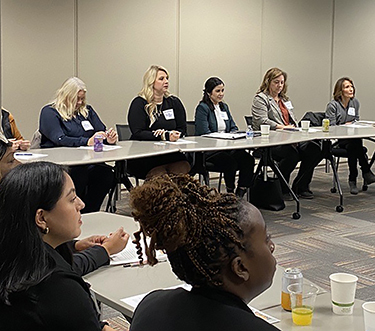|
Subscribe / Renew |
|
|
Contact Us |
|
| ► Subscribe to our Free Weekly Newsletter | |
| home | Welcome, sign in or click here to subscribe. | login |
Construction
| |
 |
October 16, 2023
5 not-so-secret tips for winning work
Absher Construction

Caldwell
|

Mayer
|
As a general contractor, the No. 1 question small, disadvantaged and diverse subcontractors ask Absher is, “How do I get work with your company?” There is no secret handshake or magic word to being awarded contracts — we want to work with a diverse group of subcontractors that contributes to our projects’ successes and mirrors the communities which we serve.
The best way to win work with Absher, or any general contractor, is to be prepared not just in technical expertise of your trade, but also in your understanding of the contracting processes, specific project requirements, external resources, and how to leverage your current contracts into future work.
Last month, Absher hosted our annual Small-Business Summit luncheon celebrating women entrepreneurs in the construction industry. Our panel of female project managers shared their top advice to the attendees, and their top five not-so-secret tips can benefit any small, diverse business entity:
1. GET ALL CERTIFICATIONS FOR WHICH YOU’RE QUALIFIED
While many clients support diverse contracting and have specific project goals for SBE, DBE, M/WBE, veteran-owned contracting, they do not all use the same system(s) for determining which firms meet their requirements.
The Office of Minority & Women’s Business Enterprises (OMWBE) is a great first stop for certification in Washington state. Many municipalities, agencies, and even private clients recognize OMWBE certification. Some, such as King County, Sound Transit, Seattle Colleges, and the Port of Seattle utilize King County’s Small Contractors and Suppliers (SCS) certification, and federal projects for the Department of Defense and Department of Transportation utilize the Small Business Administration’s (SBA) small-business criteria.
Securing as many certifications as you are able to will help increase your opportunities and competitiveness.
2. UNDERSTAND EACH UNIQUE PROCUREMENT TYPE
Hard-bid, private/negotiated, GC/CM, and design-build contracts each come with their own requirements for qualifications, bidding, bonding, and compliance. The AGC of Washington offers classes and workshops that delve into the nuances of alternative public contracting and can help you successfully navigate unfamiliar territory. Understanding requirements will help ensure your bid or estimate will not be disqualified for a paperwork error or regulatory compliance issues.
3. KNOW THY SELF
This is the seemingly obvious, but is actually a delicate balancing act between stretching to grow your company and staying within your own parameters for being successful. Ask yourself questions such as, “Is this scope within our firm’s expertise?” Sometimes scopes of work can bleed into one another, and ensuring you’re prepared to execute the full scope or sub-tier aspects you cannot perform is key to answering this question. “Do we understand the market sector?” Flooring in a school can have much different specifications than flooring in a health care environment. “Can we be successful in this location?” Sometimes geography presents challenges unrelated to your technical expertise; circumstances such as distance from your office, waterfront adjacency; or lack of on-site storage can result in extra costs.
Answering “no” to any of these questions doesn’t automatically mean you shouldn’t pursue a project. It does mean you should have an open dialogue with the general contractor to see how they can support you in stretching to grow your capacity, and do your due diligence to ensure your resources and pricing are sufficient to help you succeed in performing the work.
4. USE YOUR RESOURCES
There are many free and low-cost resources available to diverse contractors. Organizations such as Tabor 100, Washington Minority Business Development Agency, University of Washington’s Foster School of Business’s Ascend program, Small Business Administration, and APEX Accelerators offer a wide-variety of trainings, guidance, and other resources to help grow your business.
General contractors are your friends, too! Absher offers access to our in-house Absher University trainings, hosts outreach events for upcoming projects, and facilitates small-business summits focused on individual contracting topics like safety and bonding — all free of cost. Clients such as Tacoma Public Schools host networking events to connect general contractors and small-business contractors.
Take advantage of all of these opportunities. You’ll build your knowledge and your relationships with key contacts at the same time.
5. EXECUTE AND FOLLOW UP
Congratulations, you’ve been awarded a contract — know it’s your time to shine! Pay attention to details; you’re running every aspect of the work so be sure to read contracts carefully and know what regulatory requirements apply. Don’t be afraid of requirements such as prevailing wage. Taking on bigger projects with such requirements is an opportunity to learn and grow. Staying relevant with industry best practices and technology will ensure your longevity.
Be proactive in discussing concerns with your general contractor before they become problems. We want you to succeed, and can often offer support to address challenges you may be facing such as managing cash flow, scheduling for staffing capacity, or meeting safety standards. If you do experience bumps in the road, document lessons learned and how you’ll address those on future work.
Your performance on your current job will have a great impact on your future opportunities. Developing a great reputation and relationships with estimators, project managers, and superintendents will give you free word-of-mouth marketing and recommendations. Once your work is complete, follow-up with the contacts you developed to ensure your firm is in their database and inquire about upcoming work. Acknowledge all bid notifications and, if you are unable to bid or a project isn’t right for you, explain that and clarify what types of work you are looking to pursue.
Communicate, communicate, communicate. All of these tips rely on communication between your firm and Absher, or any general contractor. When we have transparency of your needs we can offer the support, guidance, and resources that will help us all achieve our goals. Your success is our success and, most importantly, the project’s success.
Stephanie Caldwell is director of diversity, equity and community engagement at Absher Construction. Caldwell pioneered diverse business subcontracting 25 years ago, and her career has been dedicated to outreach, promotion, and advocating for small, minority-, women-, and veteran-owned businesses. Erin Mayer is director of marketing at Absher. Mayer leads all communications and marketing, and serves on the firm’s Racial Equity Advisory Council.
Other Stories:
- Ace Handyman Services franchisee Stanley Sanchez’s journey to success
- ACE Mentor Program builds a path to a fully representative workforce
- Helping diverse subcontractors clear more hurdles
- Building a culture of inclusion inside and out



